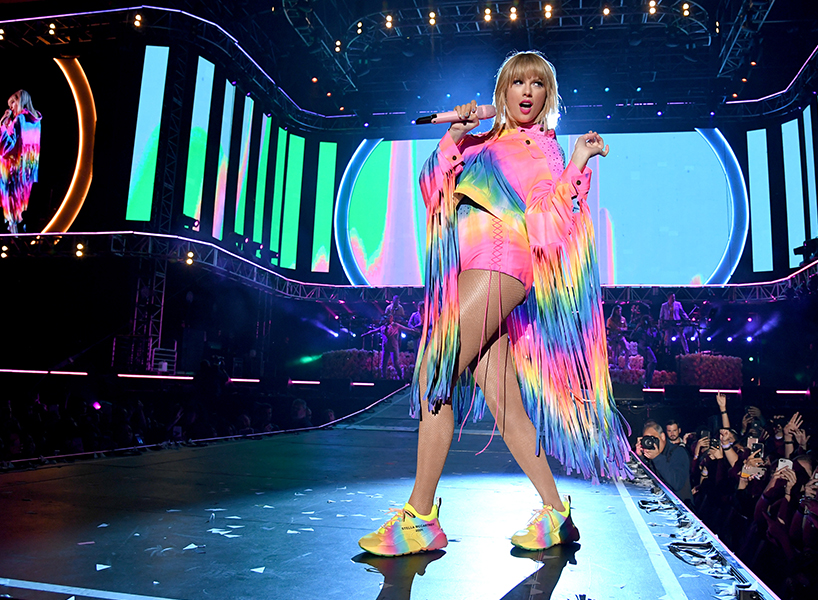Um, FYI? Taylor Swift’s New Song Doesn’t Make Her a Queer Icon
So let's all just ~calm down~


Taylor Swift’s music video for “You Need to Calm Down” was released on June 17th and it quickly inspired tweets about her new status as a queer icon. I get why: The video features a variety of LGBTQ+ stars, including Laverne Cox, Billy Porter, the cast of “Queer Eye,” RuPaul and even Ellen DeGeneres. It was co-executively produced by Todrick Hall, a talented dancer and musician who also identifies as a part of the queer community. It’s also super colourful, and shows queer people celebrating their true authentic selves.
And it wasn’t just a video. Recently, Swift has been (in appearance at least) a good ally to the LGBTQ+ community. On May 31 (one day before the start of Pride Month), she started a petition to get the Equality Act in front of the US Senate, and also addressed it in an open letter to US Senator Lamar Alexander. On June 1st, she kicked off Pride Month officially by making a “generous” donation to GLAAD. And this has prompted a wave of support from Swift’s fans, who have been donating $13 to GLAAD, too. (13 is Swift’s fave number.)
https://www.instagram.com/p/ByJzCNZDMgG/
Don’t get me wrong, I’m *so* grateful for these acts of empathy and kindness. As a queer person of colour, I appreciate any time a celebrity uses their influence and power to support marginalized communities because I know it’ll positively impact the way the rest of my queer family and I live our lives.
But the positive concrete effects to Taylor’s actions don’t change the fact that I feel apprehensive about the way Swift’s allyship is being rolled out. All of this went down on June 1, the first day of LGBTQ+ Pride Month, and it seems quite unlikely that this timing is a coincidence.
Taylor Swift’s allyship seems a little… performative
Taylor only started to discuss her personal politics last year, when she spoke in support of women’s and LGBTQ+ rights, and against Republican Tennessee Senator candidate Marsha Blackburn. And that already felt a little late. As she mentioned herself, there had been many dividing, “events in the world for the past two years,” a clear reference Donald Trump’s election. But she spent the year he campaigned and the first two years of his presidency *not* commenting on the horrible things he was doing and saying, not even when those things affected the gay community. She only seemed to want to chime in when it affected her home state of Tennessee—and when public opinion has already started to shift. If Taylor really does support LGBTQ+ rights, she has the responsibility to *actually* talk about it, even when it’s not politically expedient.
And can we talk about her actual lyrics for a sec? The line “Cause shade never made anybody less gay” makes me want to cringe, rather than feel empowered and stand taller. It’s reminiscent of all the straight white women in my life who have tried to use stereotypical gay verbiage with me in an attempt to connect. I’m not saying that *all* gay slang is exclusive to the gay community—we did appropriate “shade” and a whole other array of phrases from the Black community, after all. But when straight people use our slang as a form of imitation or performance, it often feels reductive and humiliating. Gay people are diverse, just like everyone else. We speak in many different ways. Reducing us to stereotypes sends the message that those stereotypes are all we can aspire to be, which is far from the truth.
Contributing to my perception of Swift’s support as superficial, she also brought her own drama to the video. At the end of the song, Swift is shown making up and hugging Katy Perry, putting an *official* end to their six-year conflict. I suppose that this could represent coming together regardless of a difference of opinions of views and opinions. But it feels out of place in a song dedicated to queer people—which neither Perry nor Swift identify as.
https://twitter.com/rosedommu/status/1140403241659830272
There’s a better way to show your support
Honestly, “Born This Way” by Lady Gaga, which was released February 11th, 2011, is a far better example of a Pride anthem. Not only was the song released three days before Valentine’s Day, a holiday usually used to highlight heterosexual love, it was released in a time when being queer was not nearly as widely acceptable (or even legal) as it is today. With lyrics like “‘There’s nothing wrong with loving who you are’/She said, ‘Cause He made you perfect, babe,'” and “I’m beautiful in my way/’Cause God makes no mistakes/I’m on the right track, baby I was born this way,” the song is a beautiful response to the religious hate that LGBTQ+ people often face. It feels so true to what queer people experience, talks about a variety of people and still feels genuine—and it does not rely on borrowing gay slang to make it relevant.
Again, what Taylor Swift is doing is inherently a good thing. We just need to be careful about how we describe her as a person, and ensure that we are not just calling everyone that does the literal bare minimum to welcome gay people into their industry a “queer icon.” I’m all for recruiting allies, but I don’t want someone else to capitalize on any community’s struggles and pains. But hey, if Taylor actually continues her support of LGBTQ+ rights past Pride month and past her album release, maybe then I’ll “calm down.”








